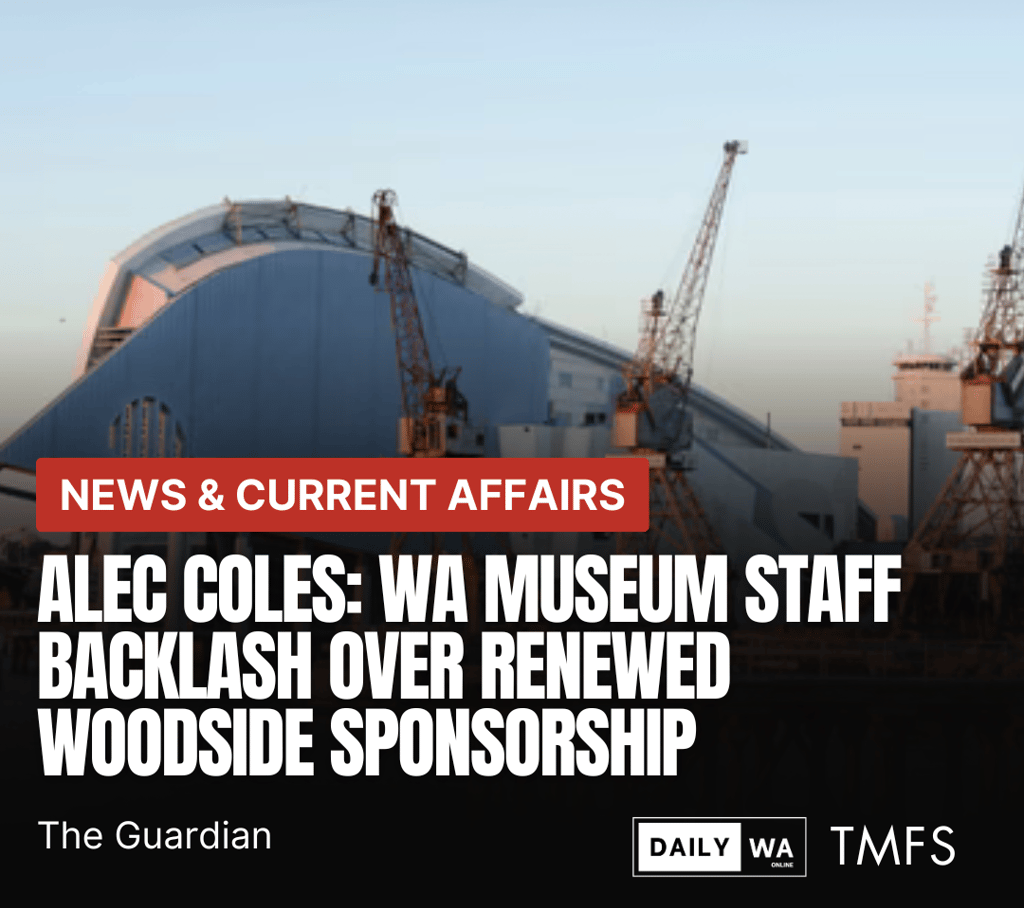Culture, Trust, and Corporate Influence: The Woodside Sponsorship Debate at WA Museum
The renewed partnership between Woodside and the WA Museum has sparked a wave of criticism from staff and the public. Beyond sponsorship, the issue highlights the delicate balance between cultural independence, community trust, and corporate influence in Western Australia.
NEWS & CURRENT AFFAIRS


When cultural institutions enter partnerships with powerful corporations, they step onto a tightrope. On one side lies the promise of financial support that can strengthen exhibitions, programs, and public outreach. On the other lies the risk of compromising trust, integrity, and the independence that museums are expected to safeguard. The WA Museum now finds itself in the middle of this precarious balance as staff backlash grows over the renewal of sponsorship by Woodside, one of Australia’s largest energy companies.
At first glance, sponsorship agreements appear practical. They deliver much-needed funding in a world where cultural institutions often face budget constraints. For many museums, these partnerships are lifelines that allow them to expand their reach and invest in new projects. Yet financial support is never neutral. The source of that funding carries weight, shaping perceptions and influencing the way communities view their institutions. This is where the tension at the WA Museum becomes most visible.
The criticism voiced by staff is not only about Woodside as a company. It reflects a larger unease about the role of fossil fuel sponsorship in cultural spaces at a time when climate change is one of the most pressing challenges of our generation. Employees, whose professional lives are dedicated to education, research, and the preservation of history, see a contradiction in aligning their work with a brand associated so closely with carbon-intensive industries. That contradiction, once exposed, begins to erode internal morale and external trust.
Around the world, similar debates have emerged. In the United Kingdom, the British Museum faced years of protests over its partnership with BP, culminating in mounting public pressure that forced a reassessment. In the United States, cultural institutions such as the American Museum of Natural History have been called to account over their connections with fossil fuel donors. These examples show that the controversy in Western Australia is part of a global movement demanding that cultural organisations consider not just their financial health but also their ethical footprint.
Supporters of corporate partnerships argue that without such sponsorships, museums risk stagnation. They point to the practical benefits: new exhibitions, state-of-the-art facilities, and programs that would otherwise be impossible to fund. These points carry weight, but they must be measured against the longer-term costs of perceived compromise. A museum that alienates its staff and community loses something far more valuable than financial resources. It loses the trust that forms the foundation of its role as a cultural and educational authority.
Trust is difficult to quantify, but it is central to the mission of any museum. People visit cultural institutions not only to see artefacts but to believe in the impartiality and integrity of the stories being told. If sponsorship creates doubt about whose interests are being served, even the most impressive exhibitions risk losing their credibility. The debate over Woodside’s involvement at the WA Museum therefore becomes less about dollars and more about values.
This controversy also raises a deeper question for Western Australia: how do we want to tell our stories, and who do we want to partner with in telling them? The state’s cultural institutions are custodians of history, science, and collective memory. Their independence is not a luxury but a necessity. Aligning too closely with industries that are themselves subjects of public debate risks blurring the line between education and promotion, a line that must remain clear for the sake of credibility.
The leadership of the WA Museum now faces a moment of reckoning. The decision is not only about sponsorship but about identity. It is about choosing whether short-term financial security outweighs long-term cultural independence. For Alec Coles and his team, the path forward will demand courage, transparency, and a willingness to engage with the voices of both staff and the public.
At TMFS, we believe that true leadership in cultural and corporate partnerships requires clarity of vision. Partnerships should reflect the values of the communities they serve, not simply the needs of the balance sheet. Western Australia has the chance to set an example, showing that financial sustainability and ethical responsibility can coexist when institutions engage openly and listen deeply.
The Woodside sponsorship may deliver resources, but the greater resource at stake is trust. Rebuilding it will require not just contracts and signatures, but dialogue, accountability, and a commitment to ensuring that museums remain spaces of impartiality and integrity.
In the end, the measure of success will not be the size of the exhibitions funded but the strength of the public belief that the WA Museum speaks for history, science, and culture without compromise. That is the foundation upon which lasting cultural legacy is built.
All rights belong to their respective owners. This article contains references and insights based on publicly available information and sources. We do not claim ownership over any third-party content mentioned.


